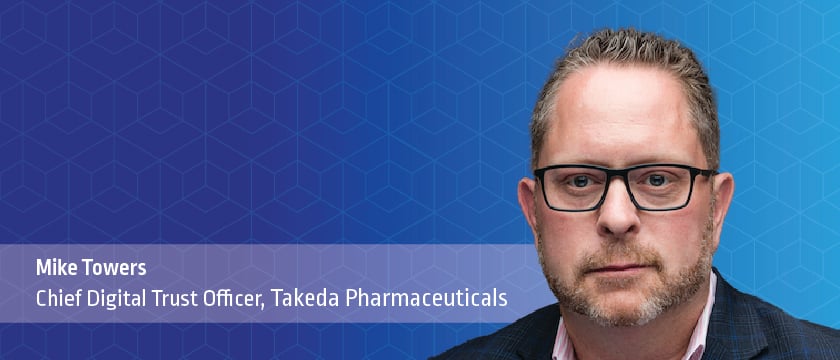
It seems logical that the more data a healthcare provider can collect, the better patient treatment will potentially be. But unlike other situations where we’re generally comfortable removing the human element from the equation, such as buying groceries or banking, there is a level of cautiousness about personal health information becoming another digital commodity. How can one be certain that their “digital DNA” is only seen by those with express permission and that it’s only used for good and as intended, such as improving healthcare or driving medical advancements?
Trust is the foundation for almost every facet of our lives, particularly in healthcare. The pandemic further emphasized trust’s central role in interactions between patients and clinicians and across interconnected IT ecosystems – and brought clarity and opportunity to restore eroding trust across the industry.
In a recent episode of our “Trust Issues” podcast, we spoke with Mike Towers, chief digital trust officer at Takeda Pharmaceuticals, about his newly minted role, his vision for the future of healthcare data security and privacy, and how trust is reshaping – and expanding – the traditional CISO role. The following are some of the key takeaways from our conversation.
How CISO Becomes Chief Digital Trust Officer
“The digital trust officer role represents a significant shift that we’re taking as an organization to rewire the entire value chain around digital data and technology and establish trust at every point. It takes on a traditional CISO’s responsibilities — areas such as security operations, identity and access management (IAM), and governance and compliance — and builds upon that foundation. We’re focused on three areas of growth: No. 1 is the data space. We’re enabling the business to be much more data-driven in its decision-making and its operations by focusing on safeguarding data and governance at every point: when it’s captured, shared, extracted and moved,” said Towers.
“The second part is digital engagement: We are widening and broadening the digital reach of our company from an ecosystem perspective to include patients, physicians, payers, government entities and donors. And the third part is what I broadly call ethical analytics, or the process of gathering all this data, and applying algorithms and analytics to that data in a systematic way that considers the moral obligations of protecting and using sensitive data, such as electronic patient healthcare information (ePHI). Ethics is increasingly essential to analytics processes to overcome unintended biases or understand whether or not the analytics you’re applying fit with the original intent and purpose with which the data was captured, as examples,” he continued.
What Makes a Chief Digital Trust Officer?
Every organization is at a different point along its transformation journey, yet most share a common objective: to have a secure, flexible IT infrastructure in place that supports growth. As they rearchitect security to encompass individual identities far beyond traditional network boundaries, CISOs are beginning to embrace the role of chief digital trust officer. This emerging title signals an organization’s commitment to secure digital practices and elevates the CISO as a business enabler. While the role is still evolving at most organizations, the chief digital trust officer often leads the charge in protecting sensitive customer and company data, driving greater transparency across digital interactions and maintaining customer trust.
One of the key requirements, Towers noted, is understanding the business inside and out. “Aspiring leaders should ask themselves, ‘Do I want to be the type of security leader who can be plucked out of my role and put into a completely different industry? Or do I want to know my business deeply so I can evangelize how people, processes and technology can enable a secure digital vision?”
As chief digital trust officer, Towers described two areas he focuses on to strengthen the security and trust connection.
“Getting from security to trust begins with an understanding that the world is much bigger than your company. It requires thinking at the ecosystem scale about who deals with you beyond your employees and contracted consultants,” he explained. “Second is understanding your business value chain: Why do you exist as a company? And what full range of interactions and interconnections are necessary to deliver that value proposition?”
“For instance, in the healthcare industry, what does it mean to get from early-stage drug research to drug development, and then formalize manufacturing and supply chain processes, and then move into payment negotiations with various insurance companies or government entities? Then understanding the challenges of delivering treatments to patients, post-treatment care responsibilities and beyond.”
“In short, it’s about understanding that value chain from a business perspective — and what it will take to strengthen resilience at every point along that chain.”
What Trust Means in the Healthcare Industry
“We’re all patients,” Towers noted, which effectively sums up why trust is so critical in the healthcare field. Each one of us has interacted with a clinician at some point in our lives, placing trust in their ability to deliver care with our best interest at heart. And increasingly, we disclose our deeply personal medical information, trusting that it will stay safe and secure as it travels across expansive networks and inhabits invisible clouds.
When used effectively, technology can continuously validate trust at every interaction point to strengthen data protection and preserve privacy, for instance, authenticating a provider before they can open a medical record or verifying privileged permissions before a virtual care app can access a patient’s diagnostic data.
“Trust is needed to effectively deliver treatment and also, frankly, to instill enough confidence that the treatment you’re getting will be effective and that your data’s taken care of,” said Towers. “Moving forward, we see much more of that trust equation being based on data and digital experiences.”
For more insights, tune in to the full episode, “Why Technology is Key to Restoring Trust in Healthcare with Mike Towers,” or listen wherever you get your podcasts.
Editor’s note: Responses have been edited for length and clarity with permission.























